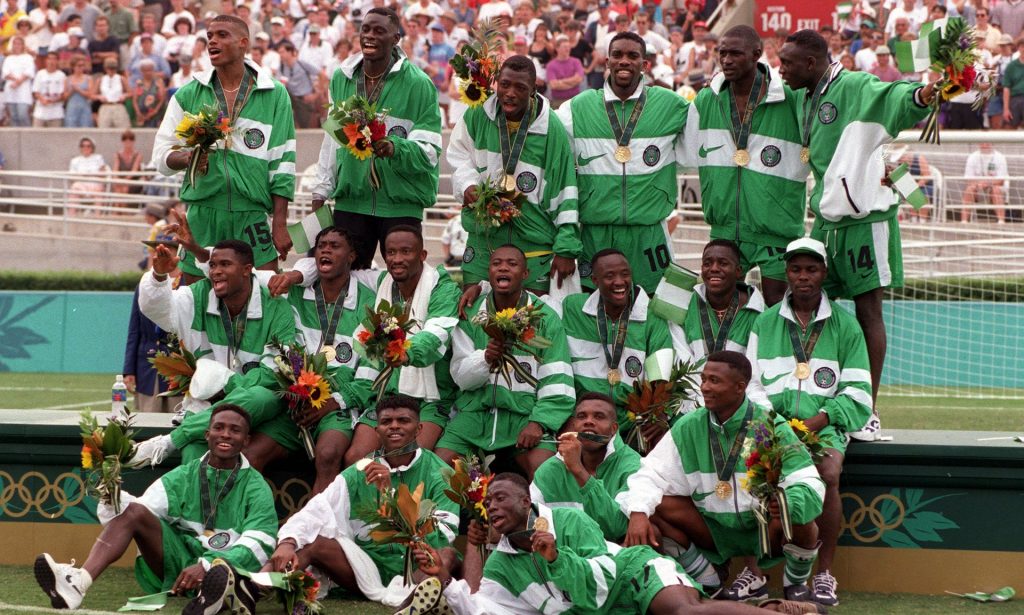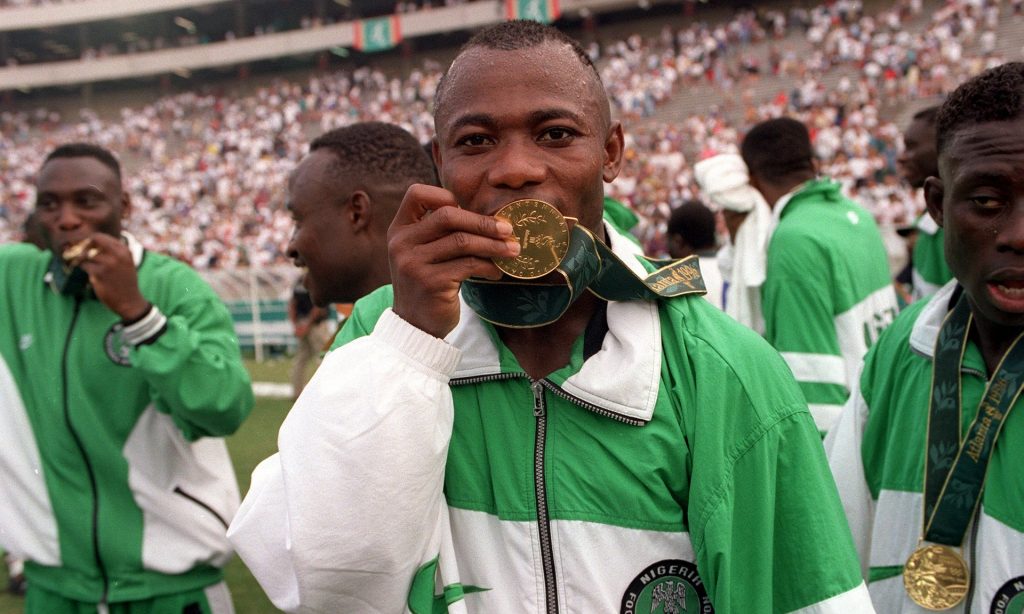
Photograph: PPP
Rotimi Fawole was a football-mad teenager when the Atlanta Olympics began in the summer of 1996. Crouched around the family TV, he remembers a summer of sitting up late to watch his team compete.
Like most fans, Fawole wasn’t expecting the Dream Team, as the U-23 squad had been hopefully christened, to go far. They had lost a pre-tournament friendly to Togo and Nigerian coach Willy Bazuaye had been sacked at the last minute and replaced by Dutchman Jo Bonfrere.
So when the team beat Argentina 3-2 in a dramatic final, in the early hours of the morning local time, Nigeria erupted . “The national broadcasting corporation allowed random people enter the studio to give shout-outs. It was mad. It was incredible. It was a sweet, sweet feeling,” he remembers.
Memories of the historic triumph have been made all the more poignant as news broke on Wednesday that this year’s Olympic hopefuls are currently stranded in Atlanta – home to their win exactly 20 years ago – due to unpaid flight bills.
With less than 36 hours before their opening match of the men’s football tournament, Samson Siasia’s squad were said to be stuck as the charter airline hired to fly them on the last leg of their journey refused to leave until they had been paid.
One of the frustrated players told the BBC: “We’ve been told to get ready to fly out in few hours but that’s been the story since last week.”
A ‘sweet feeling’
The 1996 triumph came during a tumultuous year for Nigeria. Under a military dictatorship led by Sani Abacha, the national team had been forced to boycott the African Cup of Nations in South Africa a few months earlier due to the hosts’ criticism of the hanging of the activist Ken Saro-Wiwa in the Niger Delta.
To date, the win remains its biggest victory at an international level – one that despite the widespread football fever felt across Nigeria, the country’s teams have never been able to reproduce.
The team initially qualified as runners-up in their group, winning the first two games against Hungary and Japan, but losing to pre-tournament favourites, Brazil.
Back in 1996, Abiola Kazeem was at college. Now a popular Lagos-based sports journalist, he remembers the excitement when the team made it to the semi-final to face Brazil once again.
“We started the competition on a decent note but Brazil came to the tournament with a squad stronger than the one that won USA 1994 World Cup. So we lost all hope in the semi-final, especially as we quickly went 3-1 down,” he recalls. But in an astounding comeback, the team equalised, and then won. Marshalled by captain Nwankwo Kanu, support for the team surged. “We earned the world’s respect,” Kazeem says. “We stopped being underdogs and became favourites to win the trophy.”
The agonising final against Argentina also began with the Nigeria team consigned to the back foot after a Claudio Lopez goal in the third minute and a Hernan Crespo penalty in the 50th. It seemed as though their opponents were racing to an early victory, but goals by Daniel Amokachi and Emmanuel Amuneke in the 74th and 90th minutes turned the tide in favour of the underdogs.
Joseph Dosu, the team’s goalkeeper at the tournament, remembers the glory of that night. “It was fun. We were chatting and dancing and singing all night long after we left the pitch. We had done something that no other African team had done, so we couldn’t sleep.”
Back in Nigeria, all-night parties took over streets across the country, with bars running out of beer and leaving their generators on till dawn.

Photograph: BTS
National heroes
Upon their return home, the triumphant players were each given a luxury apartment together with a plot of land in a new development in an undeveloped area of Lagos and a lump sum of 1m naira (£236,000) each, says Dosu. “The federal government [also] gave all of us the national honour of the Member of the Order of the Nigeria.”
But the success was short-lived. Four years after their momentous win, at Sydney in 2000, the Nigeria team exited the competition in the quarter-finals.
What looked like a great African breakthrough on the world stage – which started with Zambia’s “sparkle” at the 1988 Olympics and Cameroon’s great performances at the World Cup in 1990 and Sydney in 2000 – proved to be illusory.
Kazeem has a theory for why. “Success is usually accidental in Nigeria and Africa,” he says. “Abroad, there’s some level of organisation and structure to the game but here, there’s no strategy or blueprint – it’s all down to talent. African sports teams succeed in spite of chaos.”
Star goalkeeper Dosu was forced to retire soon after the Atlanta win, at the age of 23, due to injuries from a car accident, and is now a Fifa-licensed agent running a football academy in Lagos.
Midfielders Austin Okocha and Victor Ikpeba have moved into football administration. Ikpeba is also a football pundit on TV, as is Sunday Oliseh, another first-team midfielder who went on to play for Juventus and coached the Super Eagles national team in 2015-16.
Kanu, who went on to become an Arsenal hero and was named the 1996 African Footballer of the Year for his role in the Atlanta win, is one of the most decorated African footballers of all time. He is now an international businessman and Unicef goodwill ambassador.
But 20 years on, the players lament that national football isn’t doing better. The current U-23 team face myriad problems, hampering their chances of winning a second Olympic gold.
Oluwashina Okeleji, a sports journalist for the BBC, says scarce funding and poor training facilities make it unlikely the team will go far in Rio. “They are running on empty tank [there is] no money to keep the boys motivated, afford them decent accommodation or pay their allowances and bonuses. Throw in the fact that English clubs are not willing to release [Kelechi] Iheanacho, [Alex] Iwobi and Mikel [Obi] for the event, and I don’t think they have a strong squad.”
Local newspapers recently reported that the team was stranded in its Atlanta camp due to financial problems. Other athletes have resorted to starting crowdfunding campaigns after the Ministry of Sports emailed the national team informing them they had to pay for their own flights to Rio.
But despite the setbacks, the memory of Atlanta still fuels hope for Nigeria’s Olympic fans. “It’s two decades yet the memory of that final with Amuneke scoring the winner is still fresh. It gave the world a glimpse of what Africa can truly achieve on a world stage,” says Okeleji.


One Response
This post sound extremely nice.